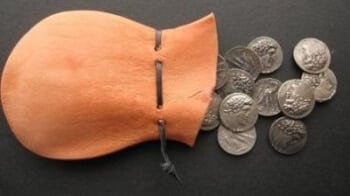 If the gospel reading for mass today sounds familiar, it is because we had the same reading for mass yesterday, except that it was from the gospel of John. These two accounts of Judas’ betrayal are very similar but with slight differences. This is one of the reasons that the gospels give valid testimony to the truth of the life, death and resurrection of Jesus Christ though. If the stories were too much alike, it would be a dead give away they were not genuine.
If the gospel reading for mass today sounds familiar, it is because we had the same reading for mass yesterday, except that it was from the gospel of John. These two accounts of Judas’ betrayal are very similar but with slight differences. This is one of the reasons that the gospels give valid testimony to the truth of the life, death and resurrection of Jesus Christ though. If the stories were too much alike, it would be a dead give away they were not genuine.
Human beings can witness the same events that take place and remember different things from one another. That’s why the police or a court of law will call several witnesses and hear their different stories, in order to determine the truth. Differences, or even slight inaccuracies do not necessarily negate the truth in the bible though, because human beings are not perfect people. Non-believers will often pick out inconsistencies or inaccuracies in different verses in the bible in order to try and prove that if one fact isn’t accurate, the whole bible isn’t true. But, you and I know differently.
God wrote the truth perfectly, even with crooked or imperfect instruments, throughout the ages. He knows our nature and takes that into account. All things serve God, both the good and the bad, in their own way. Even evil. There is nothing in all of creation that does not serve Him, according to it’s nature. Evil exists because God permits it, for His own reasons, which are far more reaching than ours. We need to remember this in the days ahead, but to also think about how this applies in our own lives and in the world we live in. Things are not what they seem to be on the surface of things. God can turn the greatest evil in our lives, into a much greater good. This is worth repeating. God can turn the worst evil or suffering that we have ever endured, and turn it into a greater good, if we allow Him to do so. This is most especially true of Christ’s life, but it is also true in ours as well. The decision on whether this actually happens or not lies within our own heart. This is the place that evil is converted into good, through the workings of God’s grace.
Jesus knew this. Actually he knew all of this. He knew Judas’s nature. He knew his own destiny. His destiny was foretold by the prophets, and most especially through the prophet Isaiah, which so clearly depicts Jesus’s suffering in today’s first reading for mass. How much more accurate could the description be, of how Jesus allowed himself to be arrested, abused and mistreated? And yet, the prophet Isaiah wrote these words over seven hundred years before they actually happened. God writes the truth perfectly throughout the ages, even with crooked or imperfect instruments. That doesn’t mean we do not have free will though.
Jesus recognized both his destiny, and Judas’ free will in today’s gospel. “The Son of Man indeed goes, as it is written of him, but woe to that man by whom the Son of Man is betrayed. It would be better for that man if he had never been born.” Can you believe what Judas did after Jesus said this? He seems to have let this little fact go right over his head, and he betrayed Christ anyway. This is exactly what mortal sin is like. Jesus clearly told Judas the eternal consequences of his actions before he ever did them, and yet, Judas did it anyway, of his own free will. How misguided can a person be? To trade an eternity of suffering for thirty pieces of silver? What was he thinking?
Judas didn’t just magically arrive at this place in his spiritual life though. He grew into it. It started in small things, in small thoughts and actions. This is why it is so important to pay attention to what Jesus Christ and the holy Catholic church teaches us. Whatever our “thirty pieces of silver” is, it just isn’t worth it. As we approach Good Friday, when Christ died for the forgiveness of our sins, maybe we should give a little thought to what our own “thirty pieces of silver” is. Too many long hours of overtime on the job? For what? More possessions? Hours of time spent on the television or computer for pure entertainment? That time could be better spent on prayer, service to God and others in our communities, and quality time with our family and friends. Maybe drugs, alcohol, music, sports, shopping, food, vacations, or relationship addictions, have taken too much of a hold in our lives? None of these things are necessarily bad, but neither was Judas’s thirty pieces of silver.
Today’s gospel is actually a blessing, because it is also a warning for us as well, not to naively assume that we have the right to do whatever we feel like, without regard to the consequences. Heaven is the paradise we all long for. Let us help one another to remember this. We are in this together with Jesus, just like his disciples were. The other eleven disciples remained with Jesus Christ and with one another. It was Judas that left in today’s gospel.
Wednesday’s Readings for Holy Week:
Isaiah 50: 4-9a / Psalm 69: 8-10, 21-22, 31, 33-34 / Matthew 26: 14-25
